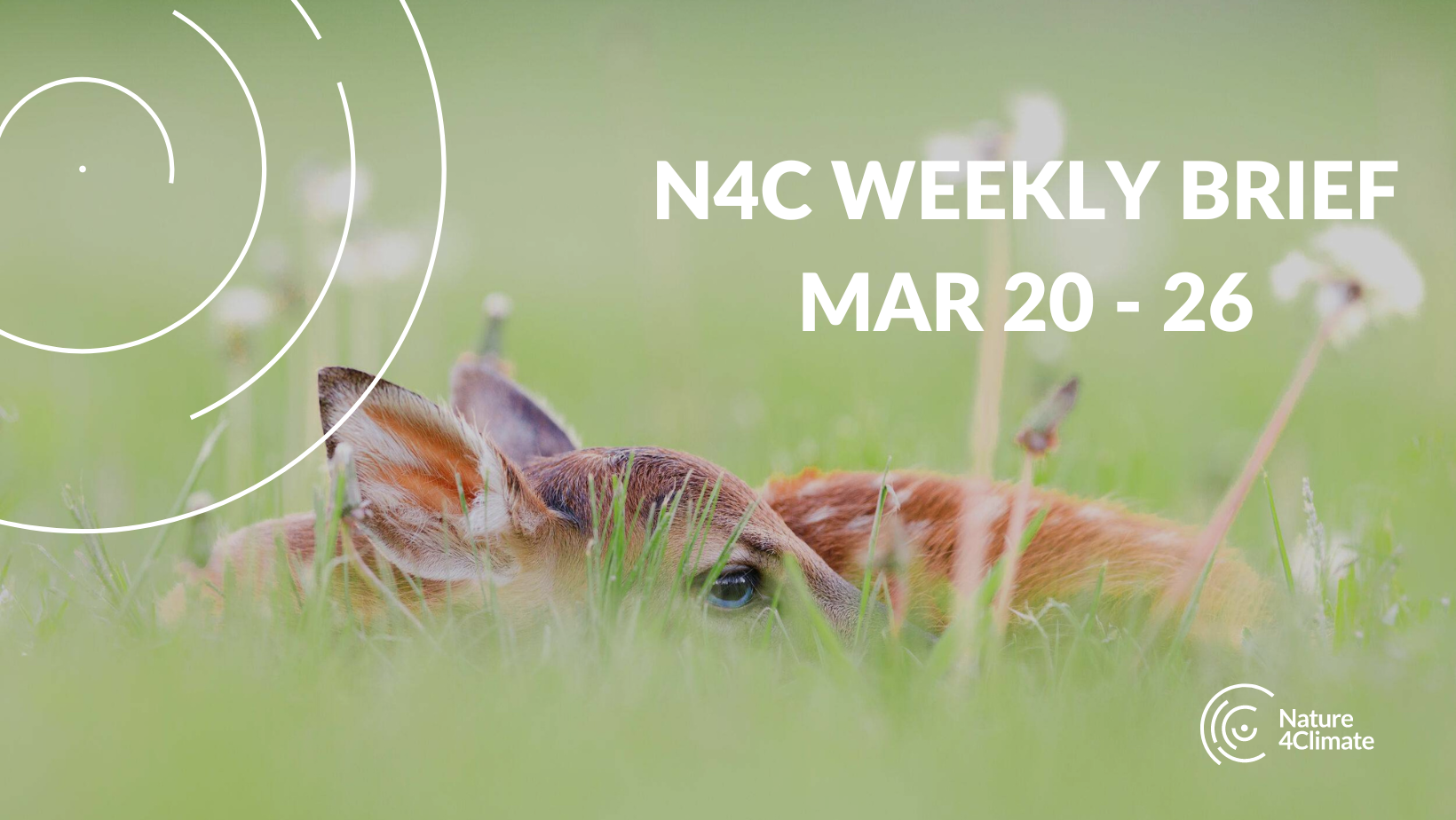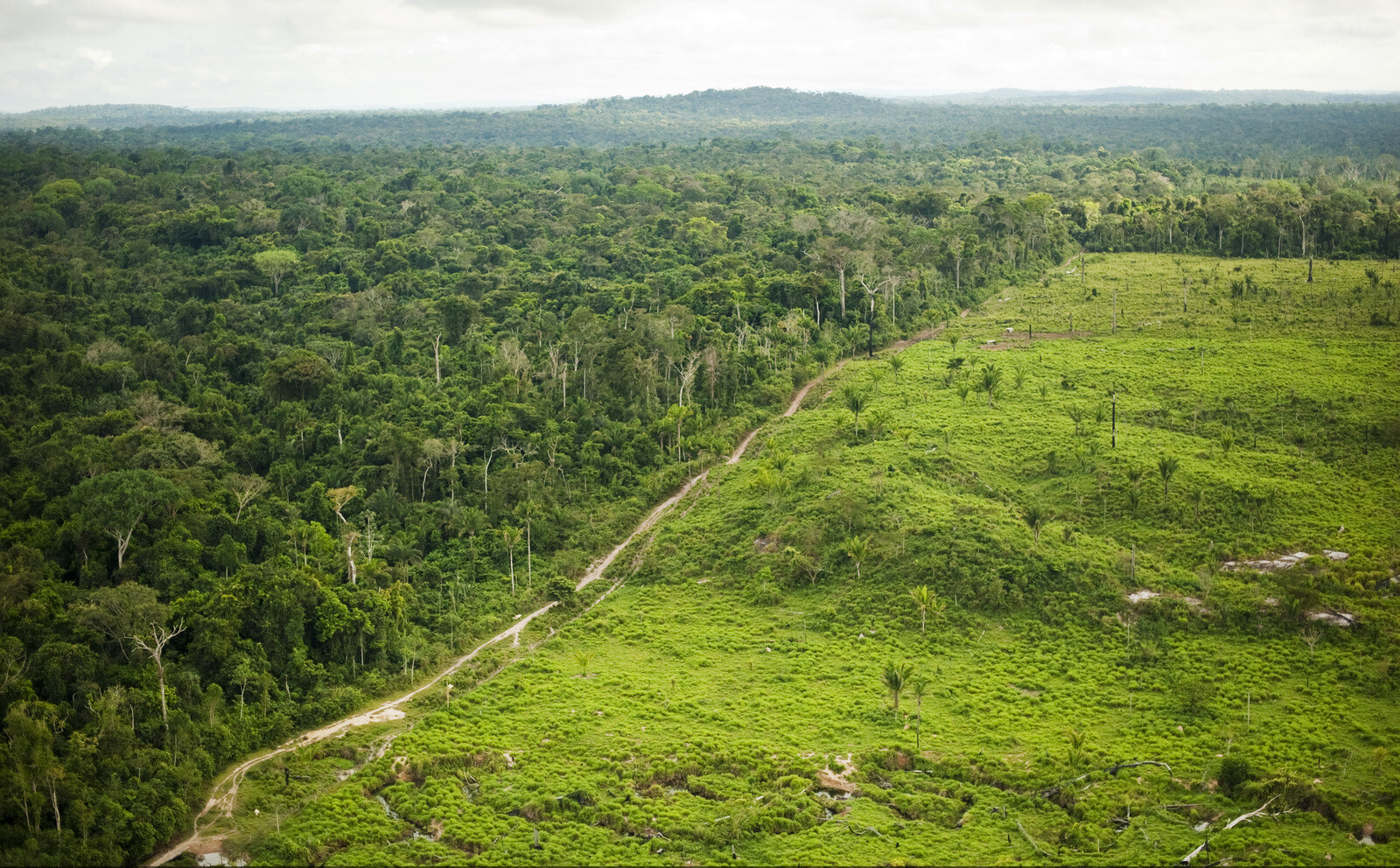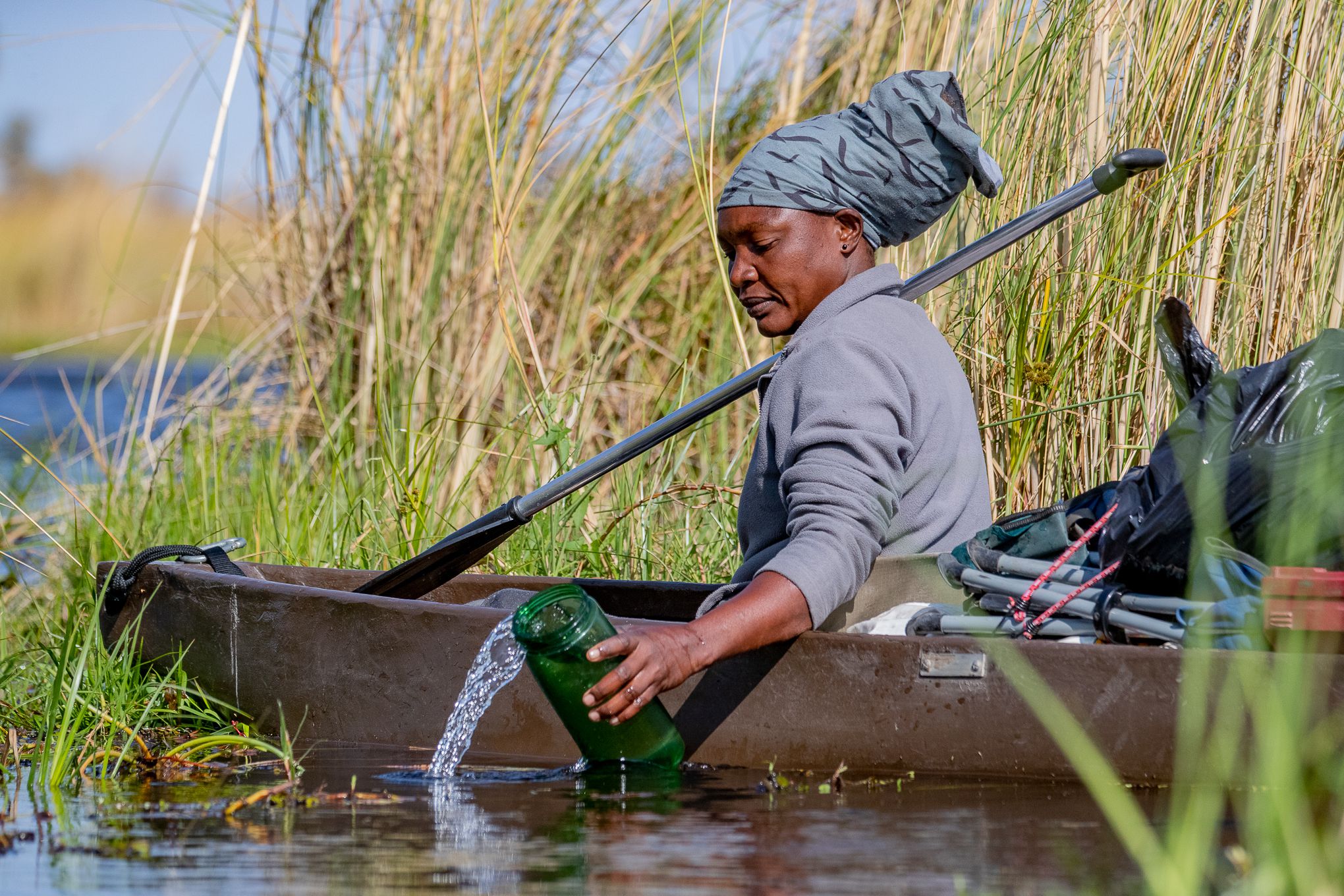
A whitetail deer fawn lies curled in the grass waiting for it's mom to return. Photo taken in Cleveland, Ohio. Copyright © Eric McBride/TNC Photo Contest 2023
FEATURED NEWS
Nature-Based Climate Solutions: Rebuilding Trust In Carbon Markets
Forbes, Felicia Jackson, 21 March
Forbes reports on a new study, developed as a partnership amongst EDF, The Nature Conservancy, Columbia University and other researchers, that shows tropical and temperate forest conservation and reforestation have strong scientific backing to drive climate solutions, including forest carbon credits. However, other natural climate solutions require more scientific research. Carbon Pulse reports that UN aviation body ICAO has only “conditionally approved” major carbon credit standards from Verra, Gold Standard and CAR for Phase 1 of CORSIA, meaning that their credits are not yet eligible for use by airlines during this phase of the international offsetting scheme. Ecosystem Marketplace carries an opinion piece by Julia Butterfly Hill arguing for the value of REDD+ projects as important mechanisms to protect forests and reduce atmospheric carbon.
EU nature restoration laws face collapse as member states withdraw support
The Guardian, Lisa O’Carroll, 25 March
The Guardian reports that the EU’s nature restoration laws appear on the verge of collapse after eight member states, including Hungary and Italy, withdrew support for the legislation. To enter into law the proposal needs support from at least 55% of EU countries representing 65% of the bloc’s population. Politico shares statements from a senior European Commission official indicating that the EU is nowhere near making good on its pledge to plant at least 3 billion trees by the end of the decade. Euractiv reveals that the European Commission is taking legal action against Germany, Slovenia, Ireland, Cyprus, and Bulgaria for alleged failures to comply with European environmental law. The Commission will begin environmental law infringement proceedings, most of which concern the Birds and Habitats Directives, described by the Commission as the cornerstones of EU biodiversity policy. BirdLife Europe, ClientEarth, EEB and WWF EU release a joint statement condemning all EU Member States who are not supporting the nature restoration law.
How The Forest Act And Business Can Help Stop Deforestation Globally [Commentary]
Forbes, Maria Mendiluce, 20 March
Forbes carries a commentary covering the reintroduction of the US Fostering Overseas Rule of Law and Environmentally Sound Trade Act, more commonly known as the “FOREST Act,” which would require companies to trace where products come from and confirm they are produced without illegal deforestation. The piece notes that major food companies have recently voiced support for the legislation in the US providing a new outlook on the potential for it to become law. New York Times reports on a new analysis by Global Witness, an environmental watchdog organization, and Trase, a nonprofit that analyzes supply chains, finding that palm oil is now the commodity consumed by Americans that contributes most to the loss of tropical forests. Researchers looked at import data and deforestation rates and found that palm oil bought by Americans may have caused 103,000 acres of deforestation, mostly in Indonesia. Mongabay shares that a report from Mighty Earth found significant deforestation in the Cerrado that can be attributed to soy and cattle ranching activities.
Mapping where tree-planting has the greatest climate benefit [Commentary]
Carbon Brief, Dr. Susan Cook-Patton, Dr. Natalia Hasler, Christopher A. Williams and Peter Ellis, 26 March
Carbon Brief reports on a new study published in Nature Communications which considers the effects of albedo, a measure of the reflectivity of the Earth’s surface, on the overall benefits of restoring tree cover. The study maps albedo change from restoring tree cover, finding that carbon-only estimates of the global climate benefits of tree-planting may be 20-81% too high. While the climate benefits of tree-planting in savannas in Africa and central Asia would be the most reduced by albedo, it is possible to find places that provide net-positive climate mitigation benefits in all biomes.
Utility-Caused Wildfires Are Becoming a National Problem
New York Times, Ivan Penn, 22 March
New York Times shares that large wildfires caused by power lines and other utility equipment are becoming increasingly common as forces turbocharged by climate change like extreme heat and drought wreak havoc on electric grids that were not built or upgraded to withstand them. Utilities argue that they should not be penalized for the fires that their equipment started, but critics of the industry, including homeowners and some lawmakers, say the industry is not doing enough to prevent such fires. While wildfires can be ignited in many ways, utilities with their networks of wires and transformers are a big source of worry.
SPOTLIGHT
Food Companies’ Role in Cutting

An aerial view showing deforestation for cattle ranching at São Félix do Xingu, a municipality in the Brazilian Amazon that has one of the highest rates of deforestation in the country. ©Haroldo Palo Jr./ TNC
A new report series titled Future Fit Food and Agriculture, from the Food and Land Use Coalition, We Mean Business Coalition and World Business Council for Sustainable Development shows how investments of US $205bn per year between 2025-2030 – or less than 2% of projected food sector revenues – could mitigate nearly half of global food system emissions and unlock many other benefits. A webinar on April 11th will help explain the reports’ findings and explore the role companies should play in making the global food system fit for the future.
2024 Brazil Nature-based Solutions Investment Summit
Investors engaged in the Brazilian NbS sector are invited to apply and join the 2nd Brazil Nature-based Solutions Investment Summit this May 22nd, organized by Capital for Climate and Converge Capital as part of the Brazil Climate Investment Week (May, 21-23). The complete agenda can be found here. Only accredited and institutional investors will be allowed to attend.
The summit will present macro-opportunities and context setting sessions on the policy context, risk management, and catalytic finance, as well as presentations by 25+ nature-positive opportunities spanning funds, project developers, and enterprises across asset classes and solutions including agroforestry, the forest bioeconomy, regenerative agriculture, ecosystem restoration, restoration of degraded pastureland, sustainable livestock management, nature tech, and more.
FOR YOUR INFORMATION
ZSL SPOTT reaches its 10th anniversary, publishing a new blog on how it’s helping businesses with due diligence for EUDR and sharing a new video training portal.
Serena Capital shares insights into the evolution of VC investments in the emerging nature tech sector for 2023, building on its work with Nature4Climate’s for the State of Nature Tech report last year.
Planet Tracker releases its Nature Scorecard, ranking 373 companies by the number of nature initiatives and frameworks of which they are a member, on both a voluntary and involuntary basis.
NRDC covers a joint statement from 130+ organizations to international leaders, calling for global accountability as essential to delivering on forest commitments.
We Mean Business Coalition shares new research indicating that companies would substantially boost their climate investments if the corporate net-zero architecture recognizes and rewards investments in transparent, high-integrity carbon credits. They also seek greater confidence in the effectiveness of the carbon credits they purchase, ensuring they deliver tangible and meaningful results.
PANORAMA promotes examples of inspiring and replicable solutions for a healthy planet, sharing 1,445 solutions from 1,030 providers.
Global Witness calls on Congress to pass the FOREST Act to stem the flow of illegal deforestation-linked imports into the country following research finding that an area of tropical forest the size of Los Angeles has been lost in two years thanks to imports of deforestation-linked palm oil, beef, coffee and other products flooding the US market.
The French Facility for Global Environment (FFEM) and Conservation International jointly announce a €2.5 million investment aimed at addressing the intertwined crises of climate change and biodiversity loss in the Amazon.
The Nature Conservancy publishes an analysis of the benefits of seven corporate watershed projects focused on nature-based solutions. The report provides lessons learned across the cases and a proposed framework for accounting for multiple benefits of replenishment projects.
Center for Biological Diversity covers a report from the U.S. Fish and Wildlife Service finding that the lower 48 states have lost 50% of their wetlands since the 1780s. The rate of wetland loss has accelerated by 50% since 2009, amounting to a net loss of 670,000 acres — an area about the size of Rhode Island.
The Nature Conservancy releases a paper showing how companies can incorporate a watershed health approach into their business using The Coca-Cola Company as a case study.
Conservation International discusses a new report finding that unsustainable development has pushed one-fifth of the fish in the Mekong River — the lifeblood of Southeast Asia — to near extinction. If countries work together, it could be possible to reverse the damage to the river.
UNEP explains how the International Methane Emissions Observatory (IMEO) uses satellite data and machine learning to track methane releases, providing businesses and policymakers with data that allows them to stem methane leaks.
UN REDD shares that its achievements and lessons in Costa Rica were captured in issue #287 of Revista Ambientico, the only environmental magazine in the country’s higher education system.
WBCSD shares preliminary lessons of the Farmer First Clusters Initiative with quantitative results on farmer engagement, farm area covered by each solution and area of native vegetation conserved, alongside insights on producer engagement. To amplify access to knowledge acquired through the deployment of the FFC, the Soft Commodities Forum is unveiling an interactive map through which a broad audience can visualize impacts and lessons learned from the field.
Chocolate Scorecard surveys and ranks the world’s chocolate companies, evaluating them based on transparency and traceability, worker incomes, pesticide use, use of child labor, and impact on climate.
CASE STUDY
N4C is compiling an index of NBS case studies, together with an interactive map, to highlight action on the ground. Each week, we will be choosing a case study to present, to help give concrete examples of work being done to bring NBS theory into practice.
Okavango Wilderness Project
WHERE: OKAVANGO RIVER BASIN, ANGOLA AND BOTSWANA
TYPE OF NCS SOLUTION: PROTECT
The National Geographic Okavango Wilderness Project (NGOWP) is working to protect the Okavango River Basin, covering areas in both Angola and Botswana. The project collaborates with regional governments, NGOs, and local communities to help establish community-based alternative livelihood cooperatives to support a conservation-based local economy. These collaborations facilitate the development of sustainable conservation plans and watershed protection.
NUMBER OF THE WEEK – 159 MtCO2e/yr
The annual carbon dioxide emissions that could be sequestered by meeting Indonesia’s reforestation potential by 2050. A new study mapping where reforestation would be most effective finds that many tree planting projects in places like Indonesia have a high potential for carbon removal. See more details on the potential for natural climate solutions in N4C’s naturebase.
GOOD NEWS
California tribe becomes the first to manage land with National Park Service
California’s Yurok Tribe, which had 90% of its territory taken from it during the gold rush of the mid-1800s, will be getting a slice of its land back to serve as a new gateway to Redwood national and state parks visited by 1 million people a year. The Yurok will be the first Native people to manage tribal land with the National Park Service under a historic memorandum of understanding signed on Tuesday by the tribe, Redwood national and state parks and the non-profit Save the Redwoods League. The agreement “starts the process of changing the narrative about how, by whom and for whom we steward natural lands”, Sam Hodder, president and CEO of Save the Redwoods League, said in a statement.

